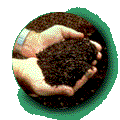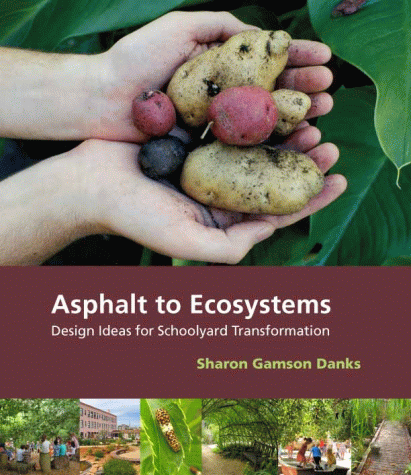
Bay Tree Design's EcoSchool Design®
Visit the website for Sharon Danks's exciting new book about green schoolyards!
"Waste" as a Resource for School Grounds
Many schools around the world are finding ways to use "waste" as a resource on their grounds, while teaching their students about closing nutrient and resource cycles.
On traditional school grounds, resource-use flows in one direction. New products are purchased for the school and when they are "used up" they are thrown away and carted off to a landfill. Some schools are making substantial efforts to close their resource use and nutrient cycles by reducing their overall consumption levels to cut down their waste stream, reusing durable goods, and recycling and composting additional materials. Many schools also reuse or recycle building materials in the construction of their green schoolyard projects. The list of resources below provides information about using waste as a resource on school grounds, and will help you to get started on related projects of your own. The list of case studies below includes examples of related projects that are already working at schools around the world.
Please contact the webmaster if you know of additional resources or case studies that should be added to this page. Thanks! sharon@ecoschools.com
Resources for School Ground Waste Reduction Programs
| Resource Title | Description |
Location |
| Rot Web | Good online "how to" information about many types of composting. Website also includes information for teachers. | National, USA |
| Scrap Tire News Online |
Articles about reusing tires for playground surfaces and other uses. |
National, USA |
| Wastes: Teacher Resources and Tools, Environmental Protection Agency | A collection of waste-related resources and tools for teachers. | National, USA |
| Compost School, University of Maine, Cooperative Extension | Extensive composting resource list, including online links. | Orono, Maine, USA |
| WormWoman.com | Mary Appelhof's website for worm composting resources. Terrific online resources from one of the leading experts in the field of vermiculture. | Kalamazoo, Michigan, USA |
| Cornell Composting, Cornell Waste Management Institute | Website includes a detailed section specifically about composting in schools, composting case studies in New York, and resources for composting. | Ithaca, New York, USA |
|
Resources around the World |
||
| The Compost Resource Page | Extensive online information about composting all over the world. Topics include compost bins, worm composting, composting toilets, large scale composting, home composting, and more. | International |
| The Composting Council of Canada | A Canadian national nonprofit organization promoting composting. | National, Canada |
| City Farmer, Canada's Office of Urban Agriculture | Extensive website with excellent articles about gardening and many types of composting. | Vancouver, British Columbia, Canada |
Case Studies of Waste as a Resource on School Grounds
| School Name | Project Description | Location |
| Campus Center for Appropriate Technology, Humbolt State University | Website has good explanations of waste management principles. Onsite projects include: vermiculture, composting, gray water treatment marsh, recycling, and more. | Arcata, California, USA |
| Laytonville School | Large-scale vermiculture and waste-reduction project that transforms almost all of the school's cafeteria food scraps into compost and animal food. The project saves the school thousands of dollars each year. The Worm Cafe, an excellent book about this project by teacher Binet Payne, is available for purchase online. | Laytonville, California, USA |
| John T. Lyle Center for Regenerative Studies, California State Polytechnic University, Pomona | One of the first examples of "ecological school grounds" at the university level. Excellent model of resource efficiency, recycling, nutrient cycling, and material reuse. | Pomona, California, USA |
| Montgomery High School | This school has an extensive recycling program established in 1995. Paper, cardboard, cans, plastic, and glass containers are recycled. Their schoolyard Native Plants Garden also makes extensive and artful use of recycled building materials. | San Diego, California, USA |
| Solana Vista School | Composting program at an elementary school in Southern California. | Solana Beach, California, USA |
| Georgian Forest Elementary School | This school tries to "reduce, reuse, and recycle," particularly to reduce their cafeteria waste stream. They have an informative webpage about their VermiLab Project that composts food scraps and uses the product to enrich their school garden. | Silver Spring, Maryland, USA |
| Cornell University | Cafeteria food scrap composting program at the university. | Ithaca, New York, USA |
| Keene Valley Central School | Cafeteria food scrap composting program for elementary through high school. Compost used in their garden. | Keene Valley, New York, USA |
| Adam Joseph Lewis Center for Environmental Studies, Oberlin College |
The A.J. Lewis Center for Environmental Studies embodies the principles that are taught at this school. The building is extremely energy efficient, and is a net energy producer. Recycled products were used in the building's construction. A living machine processes waste products from the building's toilet system. |
Oberlin, Ohio, USA |
|
Waste as a Resource for Schools around the World |
||
| Richard Wakefield Primary School | Recycling program, orchard, vegetable garden, wildflowers, living willow bird hide, and a maze. | Staffordshire, England |
| Gunnesbo School | School has gardening, composting, poultry, solar panels, and an environmental committee (in Swedish and English). Composting projects include worm bins, a rotating hot compost bin, and two stationary hot compost bins. | Lund, Sweden |

